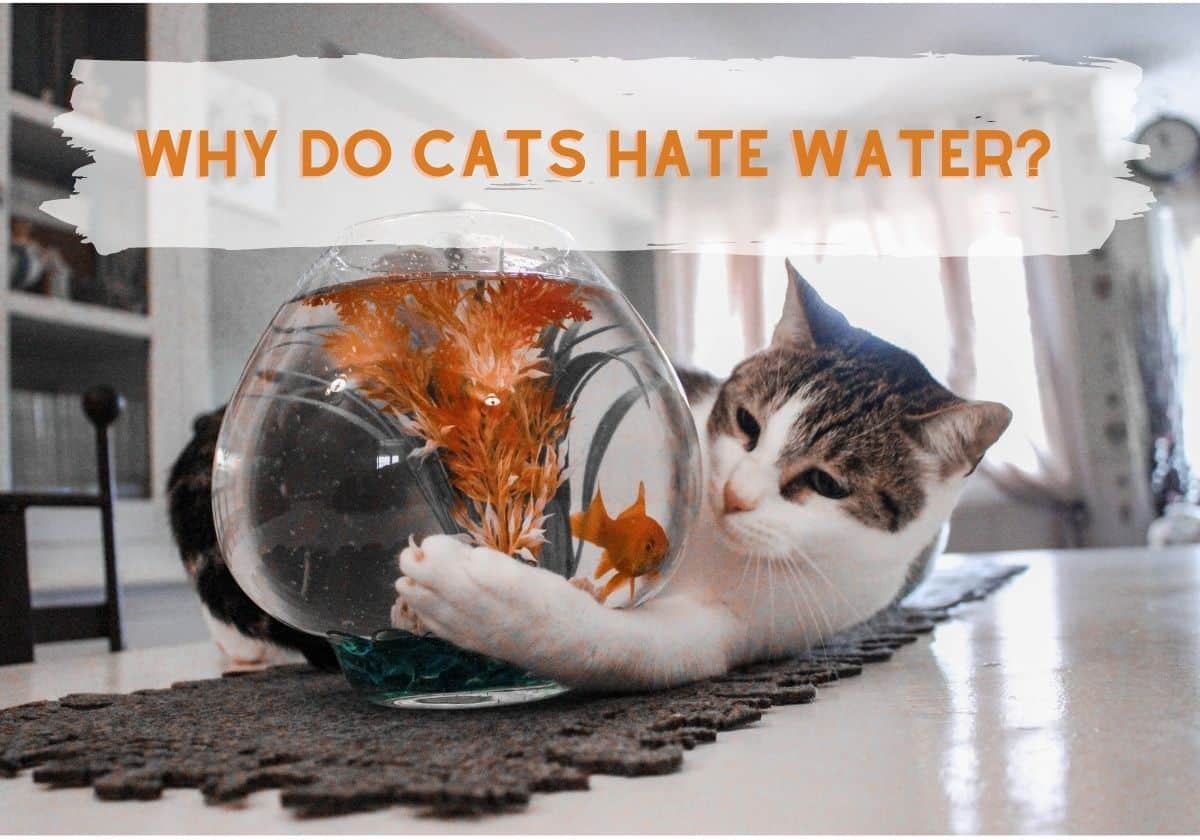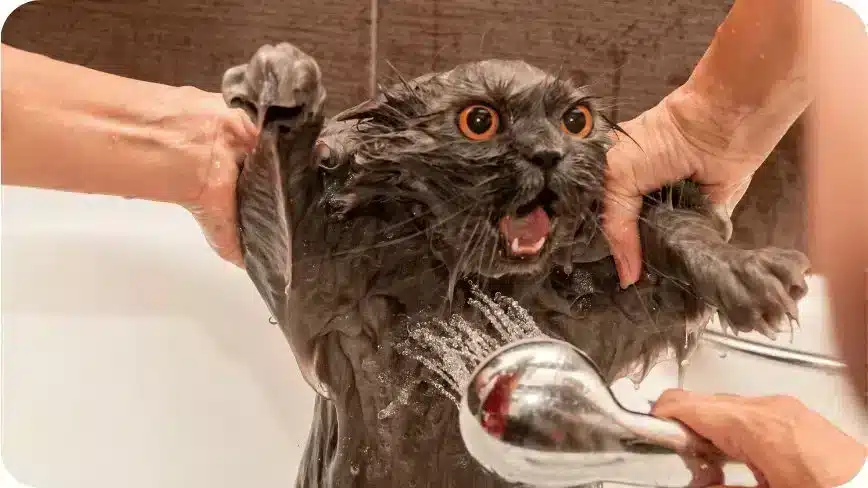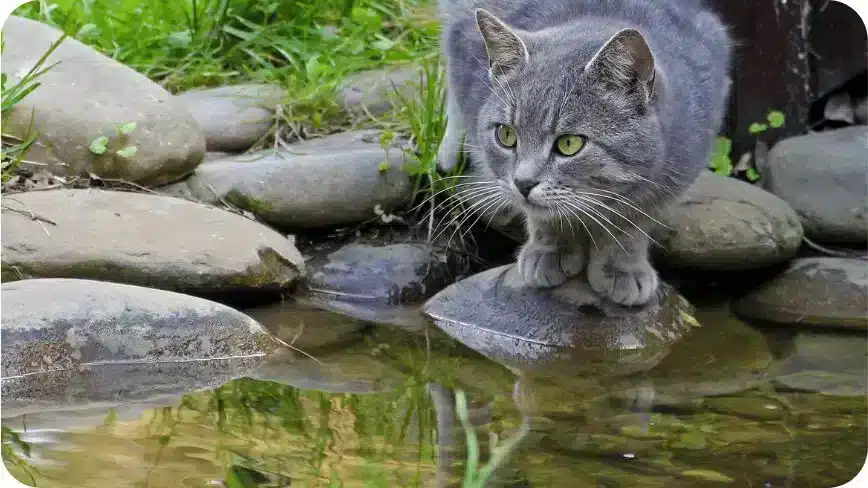Why Do Cats Hate Water? Unpacking the Reasons Behind Feline Water Aversion

Sharing is Caring!
Introduction
Cats are known for many things, from their adorable antics to their independent nature. One thing that many people associate with cats is their aversion to water. From viral videos of cats avoiding bathtubs to the popular notion that all cats are afraid of water, it’s clear that this is a behavior that has captured the public’s imagination. But why do cats hate water? Is there a scientific explanation for this behavior, or is it just a quirk of feline personality?
In this article, we’ll explore the reasons behind cats’ water aversion, from their evolutionary history to their anatomy and physiology. We’ll also discuss the environmental and breed-specific factors that can influence a cat’s relationship with water, and offer tips for ensuring that your cat stays hydrated and healthy, even if they’re not fans of the wet stuff. So, if you’ve ever wondered why your cat runs in the opposite direction as soon as they hear the sound of running water, read on to find out the answer to this feline mystery.
Reasons Your Cats Afraid Water
Cats’ aversion to water is a well-known fact among cat owners. But why don’t cats like water? There are several reasons that contribute to their water phobia. Factors such as evolutionary biology, sensitivity to temperature and wetness, negative experiences, lack of exposure, and myths and misconceptions all play a role in why cats may be hesitant to interact with water. By understanding these reasons and respecting our cats’ individual preferences, we can help our feline friends develop a more positive association with water if they choose to.
Cats Evolved Reasons

Cats’ aversion to water can be traced back to their evolutionary history. Domestic cats are descendants of wildcats that evolved to survive in desert environments, where water was scarce. As a result, cats may not have evolved to deal with water in the same way as other animals. This lack of exposure to water may be one reason why many cats dislike it.
Experts speculate that cats’ ancestors may have also evolved to avoid water as a defense mechanism against parasites and predators. Water can be a breeding ground for mosquitoes that transmit diseases to cats. In addition, larger predators such as alligators or crocodiles could pose a threat to small wildcats near water sources. While domesticated cats may not encounter the same threats as their wild ancestors, their instincts may still tell them to avoid water as a precautionary measure
Sensitivity to temperature and wetness

Water that’s too cold can also cause cats to go into shock or hypothermia, which is dangerous for their health. Cats have a higher body temperature than humans, and their bodies are not as well-equipped to regulate their body temperature in extreme environments. If a cat gets too cold from being wet, it can lead to health complications and even be life-threatening.
In addition to the physical discomfort of getting wet, cats may also find the sensation of being wet fur unpleasant. The feeling of water on their fur can be jarring and unfamiliar, which can cause them to feel stressed or anxious. Cats are creatures of habit and routine, and anything that disrupts their routine can be upsetting to them.
Overall, the sensitivity to temperature and wetness is one of the main reasons why do most cats hate water. As responsible pet owners, it’s important to be mindful of our cats’ preferences and to avoid forcing them into situations that make them uncomfortable or stressed.
Negative experience

Cats are known for their dislike of water, and this can be due to negative experiences they’ve had in the past. If a cat has had a traumatic experience with water, such as being forced into a bath, they may associate water with fear and stress. This negative association can be difficult to overcome, even with gentle training and positive reinforcement.
Bathing a cat can be a challenge, especially if cats hate water. However, there are times when a cat may need a bath. For example, if they get into something particularly dirty or smelly, a bath may be necessary to keep them clean and healthy. In these cases, with the right how to bathe a cat, you can help your cat overcome their aversion to water and maintain their hygiene without causing undue stress or anxiety.
Lack of exposure

Another reason why do cats not like water is that they have little exposure to it. If a cat has never been exposed to water, they may be wary of it simply because it’s unfamiliar. Without positive experiences with water, cats may default to their natural instincts and avoid it altogether.
However, not all cats have a negative association with water, and some may even enjoy playing with it or swimming. With gentle and positive exposure to water, some cat breeds can learn to appreciate it as a fun and stimulating element in their environment.
Cats and Grooming

Cats are known for their fastidious grooming habits and sense of cleanliness, which may be one reason why do cats hate water. They can usually clean themselves effectively without needing a bath, thanks to their specialized tongue with tiny, backward-facing barbs that help them remove loose fur and dirt from their coat. Additionally, their ability to retract their claws enables them to groom hard-to-reach areas.
This natural ability to clean themselves means that cats may not need a bath as frequently as other animals. However, there may be times when a bath is necessary, such as when a cat gets into something particularly dirty or smelly. In these situations, it’s important to approach the bathing process with care and patience to avoid traumatizing the cat and contributing to their aversion to water.
By understanding cats’ natural grooming habits and preferences, we can help them maintain their cleanliness and hygiene without causing undue stress or anxiety. While many cats may dislike water, it’s important to respect their individual preferences and provide alternative methods like brushing and spot-cleaning to keep them healthy and happy.
Myths and Misconceptions

There are many myths and misconceptions surrounding cats and their relationship with water. One common misconception is that all cats hate water. While it’s true that many cats are wary of water, certain breeds actually love water, they can enjoy playing in it or swimming.
It’s important to understand that cats are individuals with their own unique personalities and preferences. Some cats may be curious about water and enjoy playing with it, while others may prefer to keep their distance.
Another myth is that giving a cat a bath makes them cleaner. However, cats are fastidious groomers and are able to keep themselves clean and hygienic with their saliva and grooming habits. A bath may be necessary in certain situations, but it’s not necessary for routine grooming.
Conclusion
In this article, we’ve explored some of the reasons why are cats scared of water. We’ve looked at evolutionary biology, sensitivity to temperature and wetness, negative experiences, lack of exposure, and myths and misconceptions.
As a pet parent, it’s important to understand and respect our cats’ individual preferences and personalities. We should avoid forcing cats into situations that make them uncomfortable or stressed, such as being forced into a bath. We can help our cats develop a more positive association with water by providing gentle and positive exposure to it, and by using alternative methods like brushing and spot-cleaning to maintain their hygiene.
In conclusion, while the question “why does cat hate water” may not have a definitive answer, we’ve explored some of the factors that contribute to this behavior. By understanding our cats’ individual needs and preferences, we can provide them with the best possible care and respect their natural instincts and personalities.
Sharing is Caring!
About The Author
PawCool Team
Related Categories: Cats | Cat Health & Care | Cat Stories
Latest Articles

Never Miss A Thing!
All pet stories & guides you care about








